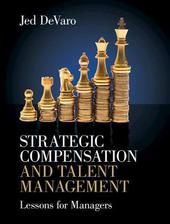
|
Strategic Compensation and Talent Management: Lessons for Managers
Hardback
Main Details
| Title |
Strategic Compensation and Talent Management: Lessons for Managers
|
| Authors and Contributors |
By (author) Jed DeVaro
|
| Physical Properties |
| Format:Hardback | | Pages:361 | | Dimensions(mm): Height 253,Width 192 |
|
| Category/Genre | Business and management
Business studies - general
Business negotiation |
|---|
| ISBN/Barcode |
9781108495202
|
| Classifications | Dewey:658.32 |
|---|
| Audience | | Professional & Vocational | | Undergraduate | |
|---|
| Illustrations |
Worked examples or Exercises; 28 Tables, black and white; 14 Line drawings, black and white
|
|
Publishing Details |
| Publisher |
Cambridge University Press
|
| Imprint |
Cambridge University Press
|
| Publication Date |
2 April 2020 |
| Publication Country |
United Kingdom
|
Description
Written for current and aspiring managers, this textbook guides readers through the core components of compensation and puts them in the manager's chair, challenging them to apply their understanding to solve business problems such as attracting, managing, and retaining company talent. The book's central theme, supported by extensive treatment of compensating differentials, is that compensation is heavily driven by market competition. The coverage also includes analytics, negotiation and bargaining, wage theft, and non-profits and small businesses, as well as a detailed treatment of stock options. Case studies are included to demonstrate the principles in practice, and 'lessons for managers' in each chapter provide practical advice and takeaways. A rich package of online teaching and learning materials, including teaching slides, sample syllabi, additional case studies, and a test bank is also provided to support teachers and students.
Author Biography
Jed DeVaro is the Wang Family Professor of Management and Economics, and Chair of the Department of Economics at California State University, East Bay where he teaches an M.B.A. course in Strategic Compensation and Reward Systems. He is a research fellow at Cornell University's Institute for Compensation Studies, a Senior Research Fellow at the Research Institute for the Finnish Economy, and an editor at IZA World of Labor. His published articles on compensation and related topics span economics, finance, strategy, organizational behavior, and human resources management.
Reviews'This is the best book on compensation I have seen. It should be read by executives, not just compensation specialists. It provides a fresh and highly useful perspective, showing how the causes and effects of compensation reflect the underlying dynamics of the labor market. And - unlike most compensation books - the writing is engaging, with a rich set of real-world examples.' Michael Gibbs, University of Chicago 'If your job requires managing people - and whose job does not? - then this book is an essential resource. The academic literature has made great strides in recent years in better understanding what goes on inside the 'Black Box', and this book encapsulates the key lessons for managers focused on recruitment, retention, and compensation of a highly skilled workforce.' Michael Waldman, Cornell University 'This book marks a coming-of-age for personnel economics. It is comprehensive, authoritative, engaging, and accessible to practitioners, students, and academics alike. I will be recommending it to my students as a must-read.' Alex Bryson, University College London 'This text provides an excellent introduction to compensation, talent management, and HR analytics for MBA and other business students. It applies economic principles to real-world problems and is written in an easily accessible, conversational style.' Tor Eriksson, Aarhus University 'Strategic Compensation and Talent Management gets to the heart of what compensation is really about: attracting, retaining, and motivating the people who accomplish an organization's goals. DeVaro uses economics to give students of compensation an intellectual foundation, then builds upon this with references to a wide range of vignettes and case studies. This approach should benefit advanced undergraduates, master's students, and even compensation practitioners who want to see the forest through the trees.' Alan Benson, University of Minnesota '... an excellent example of how to write for amanagement audience, drawing on key concepts in economics, management, psychology and organizational behaviour while avoiding all the jargon and technical detail.' Alex Bryson
|